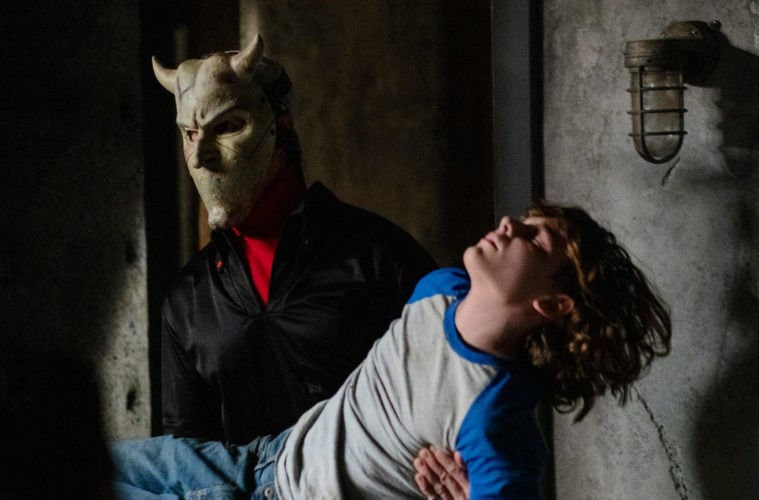 The great horror films stick with you because the emotional stakes are high; when we form an empathetic link with the main characters, our fear becomes personal. The Black Phone—a Blumhouse potboiler adapted by Scott Derrickson and C. Robert Cargill from Joe Hill’s lean short story, and directed by Derrickson, attempts to forge that crucial bond between protagonist and audience.
The great horror films stick with you because the emotional stakes are high; when we form an empathetic link with the main characters, our fear becomes personal. The Black Phone—a Blumhouse potboiler adapted by Scott Derrickson and C. Robert Cargill from Joe Hill’s lean short story, and directed by Derrickson, attempts to forge that crucial bond between protagonist and audience.
Set in a violent Denver suburb in the late 1970s, the story involves a 13-year-old boy named Finney (Mason Thames) whose main activities include playing baseball and dodging bullies. One day, he is abducted by a serial killer known locally as The Grabber (Ethan Hawke) and forced to await his impending fate in a soundproofed basement whose only features are a grimy toilet, a grungy mattress, and the titular rotary phone.
In a set-up similar to Jacques Tourneur’s masterful Twilight Zone episode, “Night Call,” the landline, for reasons never explained, seems to connect the living and the dead. Meanwhile, Finney’s little sister (Madeleine McGraw), suffering from dreams that reveal clues about the killer’s victims, engages the police to help find her missing brother.
Derrickson is one of the rare contemporary horror directors whose work reveals a consistent philosophical framework and a sincere religious devotion. He and Cargill have crafted a supernatural thriller of strong moral binaries– of good and evil, innocence and corruption. The children are unambiguously depicted as spiritual orphans whose shared trauma joins them together in a coalition of victims, living and dead, in search of cosmic justice. What’s more, the presentation of the younger sister as a Christian clairvoyant—albeit one whose sassy, profanity-laced prayers resemble an audition for a non-existent Bergman movie—is enough to convince the viewer of the filmmakers’ belief in a higher power.
Then there is Hawke, reunited with the director of Sinister, cast against type and clearly relishing the challenge. Appearing in a couple of devilish masks designed by Tom Savini and Jason Baker, the normally sympathetic Hawke is transformed into a looming figure of pure evil. His performance is effective in part because his face is rarely glimpsed in full—the force of the characterization is channeled through his moist eyes and querulous voice. In the original short story, the villain is described as grotesquely fat and bald. Hawke, lean and shaggy, brings a coiled, unpredictable physicality to an overly familiar role. Even more daring is his decision to make The Grabber’s unhealthy attraction to teenage boys inseparable from his loathsomeness. He is not afraid to play it gay.
There are elements in the film that don’t work as well as they should. A pair of investigators (E. Roger Mitchell and Troy Rudeseal) and a visiting brother (James Ransone) inserted for comic relief are underdeveloped, and the twitchy Jeremy Davies cannot break the shallow dimensionality of Finney’s alcoholic father. Derrickson frequently resorts to standard, if well-timed, jump scares and allows a few jarring music cues to deflate the suspense.
It all ends on a note so anticlimactic and lacking in poetry, it’s nearly offensive. Still, the movie works largely because it turns Finney into a proactive problem solver, albeit one who is almost totally reliant on outside help. While one cannot help but feel that there are deeper waters left unexplored, The Black Phone delivers its quota of thrills while establishing empathy for its bullied and battered youngsters. It’s horror with a heart.
Editor’s note: The disclaimer below refers to advertising posts and does not apply to this or any other editorial stories. LA Weekly editorial does not and will not sell content.
Advertising disclosure: We may receive compensation for some of the links in our stories. Thank you for supporting LA Weekly and our advertisers.

